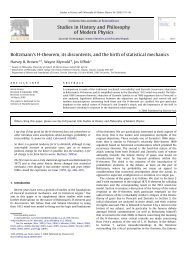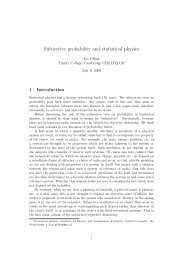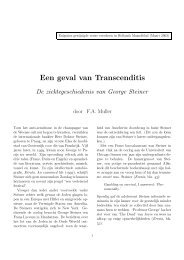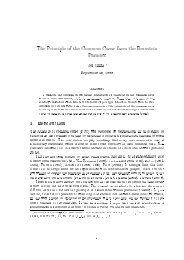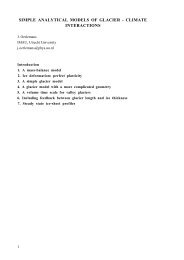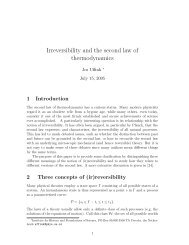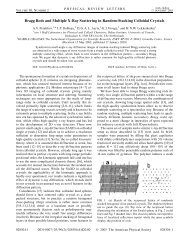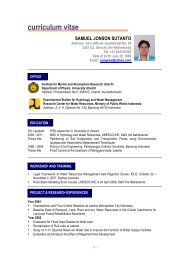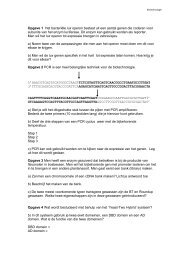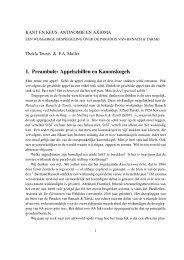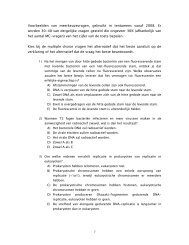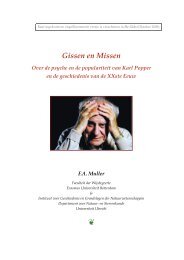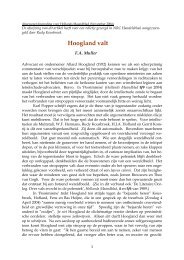FOUNDATIONS OF QUANTUM MECHANICS
FOUNDATIONS OF QUANTUM MECHANICS
FOUNDATIONS OF QUANTUM MECHANICS
Create successful ePaper yourself
Turn your PDF publications into a flip-book with our unique Google optimized e-Paper software.
I. 1. INTRODUCTION 9<br />
of affairs. [. . . ] Its acceptance would lead to an attempt to obtain a complete description<br />
of the real state of affairs as well as the incomplete one, and to discover physical laws<br />
for such a description. The theoretical framework of quantum mechanics would then be<br />
exploded.<br />
(b) In reality the particle has neither a definite momentum nor a definite position; the description<br />
by [the] ψ - function is, in principle, a complete description. The strictly defined<br />
position of the particle, obtained by measuring the position, cannot be interpreted as the<br />
position of the particle prior to the measurement. The sharp localization which appears as<br />
a result of the measurement is brought about only as a result of the unavoidable (but not<br />
unimportant) operation of measurement. The result of the measurement depends not only<br />
on the real particle situation but also on the nature of the measuring mechanism, which<br />
in principle is incompletely known. An analogous situation arises when the momentum<br />
or any other observable quantity relating to the particle is measured.<br />
Interpretation (b) is accepted by the majority of the physicists and Einstein admits<br />
[. . . ] it alone does justice in a natural way to the empirical state of affairs expressed in<br />
Heisenberg’s principle within the framework of quantum mechanics.<br />
Nevertheless, he emphasizes his preference for interpretation (a). His argument is that it is basic<br />
to physics that physical concepts refer to entities, such as particles, fields, etc., that exist independently<br />
of the observer, and are situated in space and time. Interpretation (b) renders this kind of<br />
description impossible. A second argument has to do with composite systems and will be discussed<br />
in section I. 2.<br />
(iii) The next example, also originating from the correspondence between Einstein and Born<br />
(Born 1971, pp. 188, 208 - 209), concerns a freely moving macroscopic object, for instance a star.<br />
A simple Schrödinger equation applies to the center of mass of such a body, namely that of a free<br />
particle. Since all wave functions which are solutions of the Schrödinger equation are admissible,<br />
one may consider as a solution a wave function with two peaks of equal size, located far from each<br />
other.<br />
Upon measurement of the position of the center of mass of such a body, the outcome is found at<br />
one peak in about half of the measurements, in the other half the outcome is found at the other peak.<br />
In this case it is tempting to say that for half of these measurements the center of mass was at that<br />
one position, that the object was at that position, while at the other half the center of mass was at the<br />
other position. But according to the standard interpretation this is incorrect: prior to the measurement<br />
no position can be assigned to the center of mass. Quantum mechanics applies just as well to the<br />
center of mass of a macroscopic body as to an electron. It is, however, difficult to imagine how a<br />
measurement ‘creates’ the position of the center of mass of a star as a result of a disturbance in the<br />
order of the size of one single quantum .<br />
According to Pauli, one of the representatives of the Copenhagen interpretation, this is a creation<br />
outside the laws of nature (ibid., p. 223). The laws of nature only say something about the statistics<br />
of the outcomes. The quantum mechanical probability description does not express our ignorance<br />
concerning the position of the center of mass of the body; the probability description corresponds



